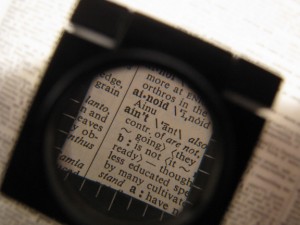On Language and Writing
I walked into it, as my wife was putting the girls down for the night. The first thing that I heard was, “No, dear. Ain’t isn’t a word.” The wife then turns to me, and she says, “Isn’t that right?”
Well, you know. And I am not sure why this time, I unexpectedly answered, “Well, Evyn . . . it really depends how and when you use it.”

I guess it was the mood I was in – and after about 30 seconds of my wife’s ranting – I was ready for the debate. She ends by saying, “And You . . . You were an English major! Hrrrmmmph!” <– (or some other equivalently weighted monosyllabic grunt).
My response – “That’s right.”
Briefly on Dogmatism – Where Good Thought Goes Bad
You know, it starts in grade school as the preceding back-and-forth portrays. Your teachers would say – “It’s a rule. Ain’t isn’t a word.” And that’s what we are taught. I might even suggest that, here, on that night, I probably should have landed on that side of the argument (you know, because we are trying to teach a six-year-old how to effectively use the language). But I didn’t, less to advocate for the devil, and more because I really feel that “ain’t” is a word.
In my eyes, “ain’t” is simply a synonym for the word “isn’t”. I mean – you understand what is meant when I say, “Dogmatism ain’t cool.” Right?
My point is – and I won’t digress too deeply into my catholic school upbringing, nor will I address the actions of some of our supposed leaders. The point, though — we as communicating creatures, smart enough to develop language, must realize that it is just a language – used, at times inadequately, to communicate true feelings, intentions and/or philosophical thought.
I mean — why be so damn critical anyway? I just isn’t constructive.
Means to the End
In a recent Curb Your Enthusiasm (one of my favs), Larry criticized his father for skimping by a few letter on his mother’s tombstone. At the bottom, it read, “Past in 2001” (or something in that line). OK, while probably not that respectful, it certainly was creative, and well, didn’t it still communicate the information it needed to?
Let’s put it this way. Likely, you use Twitter or you have turned to texting from your cell phone. Written communication, it seems, is being clipped at times to a set of commonly accepted acronyms and abbreviations.
That said — I am almost certain that you know what these three-letter combinations mean — LOL, IMO, WT*. And they work, they do a great job of saving valuable (cyber) space, and they do a pretty decent job at communicating . . . as long as everyone is on the same page.
And Of Course I See the Irony of It All – Self-Editing is Hard!
I swing to both ends of this. The rules debate. I will admit it – I am a notoriously bad speller, famous for dropping words, and even more guilty of not proofing what I spit out.
I, at times, justify this for myself by saying, well as long as I communicated what I am trying to communicate. And, yes, I know others say — typos, mispellings, and dropped words are just plain unprofessional, and further — they distract from the points you are trying to make. Those folks are probably right, and I work at improving my own shortcomings every day.
For me, and I want to give a big shout to all of the professional editors of the world, self-editing is hard! I mean this both from a proofreading standpoint, as well as, and all the way up to content management. I am frequently amazed at what these people, you know that are filling the web, pull off on a repeatable basis.
Words are Cheap, They Say
And the question, again: There sure are a lot of expert writers providing outstanding content for a myriad of outlets. And I ask myself, why jump in?
Well, simply to try to communicate and connect with the people of the world. I hope I am doing a decent job.
Update: Communication, btw, is not limited to the written or spoken word. It is probably the single most important aspect of a home project. For more on Home Projects, you could always see BuildingMoxie.com. For more on working with Communication, in my opinion, the most essential skill, please see my resume.
Thanks for reading & BMoxie BMore! ~jb (This post was originally published on BuildingMoxie.com. This is how I used to sign off back in 2009. Short for “Building Moxie Baltimore”, my original Twitter handle.)

I have an English degree and I went through the Catholic school system too. Like you, I'm of two minds with regard to standard/ non-standard English. I tend to fall into step with the dogmatists more often than not though.
English is an amazingly flexible and adaptable language. The language we speak stays completely current with technological change and it does it without the benefit of a central plan or steering committee. It's a stunning achievement when you sit down and think about it.
However, there are rules and so far as I'm concerned, the only people with license to break them are people who know them. There's a huge difference between knowing that "ain't" is non-standard and using it anyhow and not knowing it's non-standard and using it. You know?
Paul, thank you for chiming in. I think the fact that we can even have this conversation is a credit to this: "English is an amazingly flexible and adaptable language. . . ."
And to be fair – I agree with this: "However, there are rules and so far as I'm concerned, the only people with license to break them are people who know them."
You, general, must have at least a basic understanding of the rules before you can "justifiably" (sp?) break them. It's kinda that way with a lot of things; design, architecture, etc. would you say?
My short rant on dogma was directed less at how many of us were raised, and even less at how we were/are taught the language. It was intended more, and though very angularly, to draw comparison with much of the talk we are hearing from the green battlefield. Suprise, huh?
That said — I do almost believe that dogmatic figures are a necessary component of society, if that makes sense.
I, personlly, took to English more for the analytical aspects. I was fascinated by both the linguistic and critical theory that we got at the 3&4 hundred levels. . . especially around the idea that thought cannot be divided from language. . . . (I wish I would have pursued that more.)
Unfortunatly, and I will admit, my time on this may have come at the expense of learning — at least in a memorable way — some of the rules.
Thanks again, Paul. jb.
For everyone: Paul Anatar is a kitchen and bath designer and a talented blogger based out of Florida. You can find him writing here: http://www.kitchenandresidentialdesign.com/
Geez, thanks!
I love your point about thought being inseparable from language. I have studied a few languages other than English and have something approaching a comfort level with both Spanish and Italian. I call it a comfort level because true fluency is impossible if a language not native to a speaker.
If you study another language with any kind of rigor, eventually you come to see that translation is better called approximation. Culture lives inside of language and they cannot be separated. English has a present tense that's used to indicate an action happening right now. Spanish and Italian have a present tense, but it can have a fuzzy meaning until it's put into context. Present tense Italian and Spanish can mean recently, right now, or very soon.
It's a subtle difference, but it has really profound implications. Native English speakers have a British and American punctuality built right into the language. There is a slower, less time-obsessed way of life built into Spanish and Italian.
I may be making a a big deal out of this, but it's just one more example of language and culture evolving and reinforcing one another. Capitalism speaks English for a reason.
Great topic. I'll be ruminating over this one for hours!
ah romance languages. (now I feel like my blog has a little class.) For me, nothing more than the ability to dechipher some simple text in Spanish and French. Because of this, I could never call myself a linguist, nor will I be able to hang with you here.
It is interesting to hear your thoughts on the relationship between culture and language and vice versa. If you ever wanted to expand on this — "Capitalism speaks English for a reason" — I would certainly post it as a follow up — it is a very interesting statement . . . .
Anyway, thanks again Paul; it's an open invitation.
jb
Oh man, entire academic careers are made out of this stuff, I'm just a dilettante. But I do know that I never could have come to an idea like that had I never studied another language. But I am not a linguist either. It would be interesting to hear from a real linguist, a researcher, on this subject. But I do know that of the world's languages, English is the most precise and descriptive. Other languages do things that English can't –Spanish remembers the past more accurately and Italian is spoken in meter– but I'm convinced that the rise of Capitalism and the rise of English happened symbiotically.
well, I do think adding a linguist to this thread would be even classier! Anyone? This has been a great discussion. thanks again — Paul.
As always — sorry for the poor spelling and typos. jb
Right on, JB. I respect the rules as much as the next English major, but I also agree that there should be a place for "aint" in our language. It's all about audience, occasion, and purpose. See this recent Wired magazine article:
http://www.wired.com/techbiz/people/magazine/17-09/st_thompson
Enjoyed your post. Keep it up!
Elaine thank you for checking in . . . and the Wired article is an outstanding addition to this thread.
I am a house blogger (at least that's what I am shooting for). However, I find (and actually hope) that frequently I can not seperate what I do from who I am. "Father of two, with a technical day job" — for two things.
My style (at least the one I am attempting to cultivate) does take me back to the college years: There I found the narrative form "en medius res" (sp?) and that things in general have great interconnectivity — kinda like a tarrantino (sp?) movie.
Again thanks – this was actually kinda a filler, in a way meant to defend my own shortcomings. I will be back on task shortly.
Thank you thanks. & BMoxie BMore.
I really enjoyed the article. I don’t have anything to add except that I LOVED the photo. Very well done!
thanks Brian … yes Barry aka b has a keen knack for these types of photos. thanks for compliment and I like the new avi. thanks for the pop in. ~jb